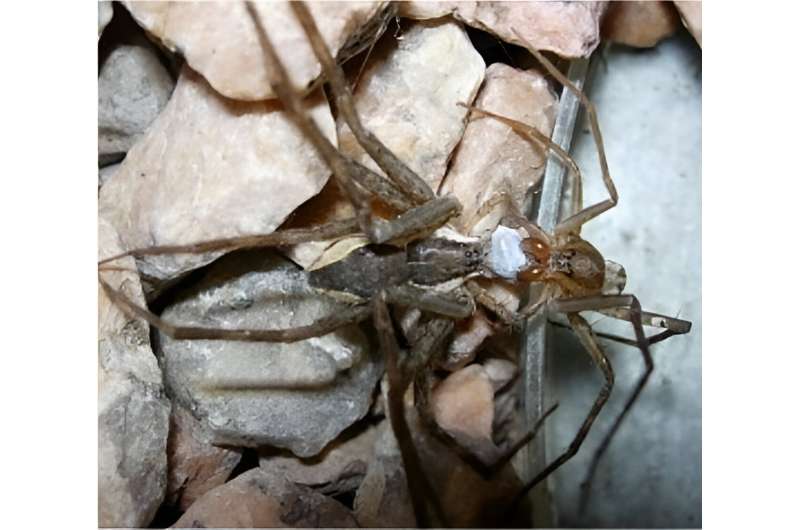This article has been reviewed according to Science X's editorial process and policies. Editors have highlighted the following attributes while ensuring the content's credibility:
fact-checked
peer-reviewed publication
trusted source
proofread
Climatic changes put the brakes on spider's 'gift-giving'

Being wary of gifts from males of the species takes on a new meaning among a South American spider species known to woo females with silk-wrapped food parcels.
Scientists in South America and Australia have discovered that environmental stresses, such as large variations in rainfall and floods in the rivers, tend to change the mating rituals of these semi-aquatic Neotropical spiders which live in riparian habitats in Uruguay and Brazil.
They found that during moderate to harsh lean times, gift-giving spider Paratrechalea ornata males often offer females a deceptive or worthless gift, rather than a food gift.
"Our study found this behavior probably corresponds with periods of time when food is more difficult to find so some males might 'cheat' by offering fake gifts," says evolutionary biologist Dr. Maria Albo, from Uruguay's Universidad de La República.
"While males of some spider populations offer prey to females as a way to convince them to mate, there might be less bountiful periods when males are more deceptive with their 'nuptial' gifts."
When local environmental conditions are harsh, these fake parcels become more common rather than the exception and both males and females become smaller and need less food, researchers say, warning of the long-term affects of climate change on spider, insect and other organisms' survival.
Flinders University arachnid and insect expert Dr. Bruno Buzatto, a co-author of the study in BMC Biology, says the gift-giving spiders display contrasting behaviors to other species where the females may devour the males after mating. The article is titled, "Stressful environments favor deceptive alternative mating tactics to become dominant."
"These spiders offer captured prey to females as way to convince them to mate," he says.
"In times of plenty, females will usually reject males if they offer fake gifts but they may eventually have to accept the gifts with no food inside when most males are forced to cheat."
The study of P. ornata concludes the potential for worthless gits to fully take over is promoted by highly stressful environmental conditions such as low rainfall and climatic variation which can affect their riparian habitats and watercourses in South America.
In turn, this involves widespread prey shortages, female fecundity and general decline in adult spider size.
The research team has been studying the gift-giving patterns of Paratrechalea ornata, a roughly bottle cap-sized semi-aquatic spider found in Uruguay and surrounding South American countries, to gain insights in the event of future climatic and environmental changes.
More information: Maria J. Albo et al, Stressful environments favor deceptive alternative mating tactics to become dominant, BMC Biology (2023). DOI: 10.1186/s12915-023-01664-5
Journal information: BMC Biology
Provided by Flinders University


















